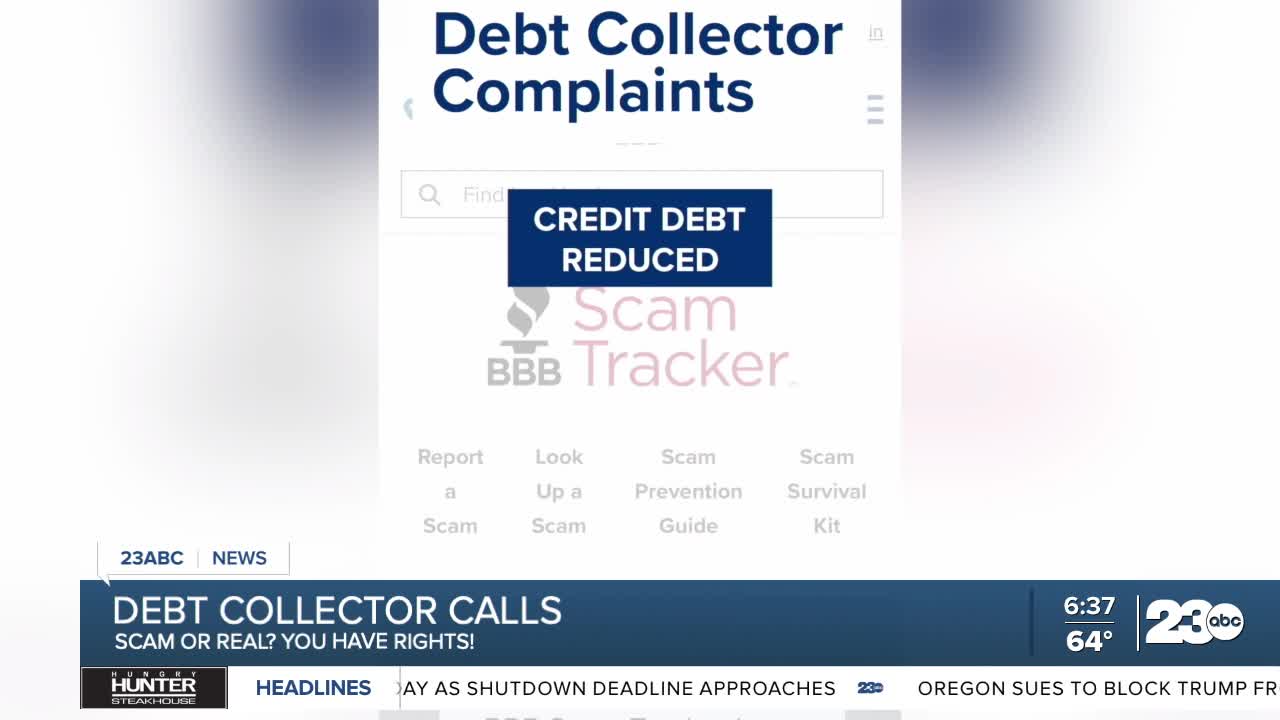BAKERSFIELD, Calif. (KERO) — Debt collector calls: Scam or real? You have rights!
Better Business Bureau
*File collection agency complaints and check reviews at BBB.org. See more Scam Prevention videos at joeknowsbetter.com
It can be frustrating and scary to fall behind in payments on credit cards or other accounts. When the calls from collection agencies start, it adds a new level of stress. Don't panic. Instead, understand your consumer rights, learn what collection agencies can and cannot do, and then take steps to resolve the issue.
The first thing to understand is that debt collection process rules are in place to protect consumers.
The Federal Trade Commission (FTC) enforces the Fair Debt Collection Practices Act (FDCPA) in the United States. The FDCPA prohibits debt collectors from using abusive, unfair, or deceptive practices when trying to collect a debt.
The FDCPA considers anyone who regularly collects debts owed to others as a debt collector. This means collection agencies, lawyers who collect debts, and companies that buy debts and then try to collect them are all covered.
The FDCPA applies to personal, family, and household debts, including money you owe on credit cards, auto loans, medical bills, and your mortgage. It does not apply to debts incurred while running a business.
When a debt collector calls, they must follow up within five days with a written "validation notice." This notice must spell out the name of the creditor you owe money to, how much you owe, and how to proceed if you think you don't owe the money. You may want to talk to the debt collector at least once to see if you can resolve the issue, but if you decide you do not want the collector to contact you again, document it in writing. Sending a letter does not resolve the debt and will not stop action to collect the debt, but it can affect how the collector communicates with you. If an attorney is representing you regarding the debt, the debt collector must deal with the attorney instead of with you.
The Consumer Financial Protection Bureau (CFPB) explains the practices bill collectors must use when communicating with consumers and what people can do.
What collectors CAN and CAN NOT do:
CAN contact you by phone, letter, email, text message, or social media as long as they identify themselves as debt collectors
CANNOT pretend to be someone else, like a government agency or credit reporting company, or use a false company name
CAN contact you at work unless you tell them you are not allowed to get calls there
CANNOT call before 8 a.m. or after 9 p.m. (unless you agree to it)
CAN contact other people about you to find your address, phone number, and place of employment, but CAN NOT contact them more than once or discuss your debt with them (except for your spouse or your attorney).
The FDCPA details more practices that are off-limits for debt collectors, including harassment, false statements, and unfair practices. Some specific things they cannot do include:
Use threats of violence or harm, or use obscene or profane language
Publish a list of names of people who don't pay their debts
Falsely claim you have committed a crime
Misrepresent the amount of money you owe
Lie about whether or not the papers they send you are legal forms, or give you something that looks like an official document if it isn't
Tell you that you will be arrested if you don't pay your debt, or that they will seize, garnish, attach, or sell your property unless they are permitted by law to do so
Threaten you with legal action if doing so would be illegal or if they don't intend to actually do it.
Try to collect any interest, fee, or other charge on top of the amount you owe unless the contract that created your debt, or your state law, permits the charge.
Deposit a post-dated check early.
Contact you by postcard or any other means that can outwardly be identified as coming from a debt collector.
What to do when dealing with a collection agency
Keep track of all the calls you receive from a collection agency and save all written statements. Do not give out personal or financial information until you have confirmed that the collection agency is legitimate. If you can work out a deal to pay monthly or reduce your owed debt, get the details in writing. When you pay off your debt, make sure you get and save documentation of the resolved debt.
What if a debt collector sues you?
Do not ignore a lawsuit summons. A debt collector can sue you to collect a debt, and a court judgment can result in third parties like your bank or employer turning over funds to pay your debt. If you do not show up in court, you lose your chance to fight garnishment. Make sure you or your lawyer responds to a lawsuit by the date in the court papers.
You can file collection complaints also with the California Attorney General’s Office: https://oag.ca.gov/contact/consumer-complaint-against-business-or-company
the FTC, and the CFPB.
Learn more about spotting and reporting this type of scam by going to BBB.org/ScamTips.



